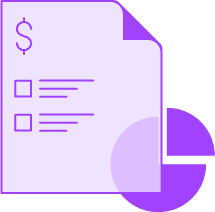Benefits of an ERP system for your business


Streamline business operations
One of the primary ERP benefits is the ability to streamline business operations by automating tasks and workflows.
With an integrated ERP system in place, companies can break down silos between departments, enabling seamless communication across different departments. This is because ERP brings together different business and financial operations on a single platform, all with a shared data source.
A well-implemented ERP system ensures that all relevant information is accessible within a single database – no more toggling between spreadsheets or searching through stacks of paperwork

Gain a competitive edge
Although ERP is popular among larger companies, it’s equally beneficial to small and medium-sized businesses (SMBs). Automation helps small businesses grow quickly by eliminating time-consuming and error-prone manual processes.
This means that businesses can override competition, and stay ahead of rivals in the market. As many SMBs are yet to implement ERP, those small businesses that do will be a step ahead of their competition.
ERP also helps improve collaboration across different departments. Businesses often lag behind their projects and find it difficult to scale due to lack of coordination between departments.
ERP brings different departments of an organization under a unified interface and enhances communication between teams and departments.
For example, sales and marketing teams can communicate with each other better, and share their data with customer service teams who can identify potential prospects, to ultimately, enhance sales.

Ensure regulatory compliance
ERP helps businesses to comply with regulations and security requirements by identifying factors that could lead to non-compliance.
A built-in compliance feature helps businesses automate regulatory protocols and generate compliance reports for industry and government authorities.
Some of the prominent regulatory statutes are the Health Insurance Portability and Accountability Act (HIPAA), the General Data Protection Regulation (GDPR), and the Energy Policy Act (EPAct).
ERP software can be customized to align with specific guidelines that apply specifically to your sector, making it easier to follow protocols consistently. This ease of access not only helps maintain compliance but also reduces errors resulting from manual processes.
Automatic updates on new rules or changes in existing regulations are immediately reflected within the system so that everyone stays informed and up-to-date without additional effort on their part.
Additionally, an audit trail feature keeps track of all actions taken within the ERP system – providing evidence when needed during audits or inspections by regulatory bodies.

Cost Reduction and Savings
One of the most valuable benefits of an ERP system is the ability to reduce costs and generate savings for your business.
By integrating various departments and functions into a single platform an ERP system can help you optimize your workflows by streamlining tasks such as inventory management, accounting procedures, and data entry, among a host of other advantages.
Automation ensures accuracy in financial processes while reducing time spent on repetitive tasks—ultimately leading to cost savings across different departments.
Moreover, implementing a cloud-based ERP offers additional avenues for cost reduction due to its inherent scalability capabilities. This means it requires minimal upfront investment (compared with traditional enterprise software) while providing flexibility when considering future growth requirements: simply adjust subscription plans as needed without spending extra money upgrading hardware resources like servers storage capacity etc., allowing more funds to be allocated towards other pressing needs within the organization.

Enhanced reporting, insights and analytics
Relying on inaccurate data to make forecasts results in predictions that are erroneous, leading to failed business strategies. As ERP unifies all datasets and eliminates inaccurate datasets, it generates reliable reports and statistically valid insights.
These insights help businesses to make meaningful forecasts and predict business outcomes. Accurate predictions and forecasts are necessary to develop business strategies that deliver success.
Another valuable aspect associated with ERP analytics is forecasting – using historical data trends along with current market conditions; organizations can better predict future demand levels for products or services while minimizing risks related to excess inventory or supply chain disruptions.
Overall, leveraging rich insights and analytics provided by an ERP system allows companies not only improve operational efficiency but also make informed strategic decisions that drive sustainable growth in today’s competitive marketplace.

Enhanced customer relationship management
An integrated CRM module in ERP allows companies to better understand and serve their clients. By centralizing and organizing all customer-related data in a single database, businesses can gain valuable insights into consumer preferences, behaviors, and requirements.
This comprehensive view of the client base supports more targeted marketing efforts, personalized communications with customers, and improved sales processes.
As a result, customer service agents can rely on accurate buyer personas and engage with customers more meaningfully.
This greatly enhances customer satisfaction and helps products and services to quickly move through the sales pipeline.
Using an ERP system enables organizations to provide exceptional after-sales support by allowing easy access to information about warranties or past purchases made by clients – reinforcing trust between customers and your brand while encouraging repeat business transactions.

Keep data accurate and consistent & eliminate data silos
As businesses grow in size and stature, they tend to subscribe to multiple software programs for different operations. This results in haphazard, redundant, and duplicate data sets.
What’s more, when employees enter data manually, there’s ample scope for human errors and redundancies.
Data consistency provided by ERP systems leads to better decision-making since managers can trust that they’re working with accurate information from all areas of their business.
ERP eliminates both these problems and creates a unified and up-to-date set of data. As a result, market research, forecasting, and business analytics will be reliable and valid.
Accuracy and consistency of data are of significant predictors of business success.

Manage employees on-site or remotely
Remote work has gained prominence over recent years due to technological advancements. Therefore, having an ERP system with built-in tools catering specifically to remote workers provides added value for companies adapting to these changes.
The latest ERP solutions are cognizant of prevailing attitudes towards work-from-home arrangements, and they also support field management protocols with robust and reliable mobile ERP applications.
Businesses can easily monitor and manage their employees remotely from an ERP’s project management module. Completing projects, tracking time, collaborating with staff, and holding meetings on video conferencing applications, are today, efficiently powered and streamlined by ERP.
With an ERP system in place, businesses can efficiently manage work schedules, time tracking, leave requests, performance evaluations, and payroll processing among other workforce management tasks.

Mobility
A significant benefit of ERP systems is its ability to provide users with access to critical business information from any device, anytime, anywhere. This increased level of accessibility allows employees and stakeholders to stay connected at all times.
Modern ERP solutions often come with mobile applications that offer a user-friendly interface tailored specifically for smartphones and tablets. These apps enable employees such as sales representatives or service technicians to quickly retrieve customer data, check inventory levels, log their activities or even create new orders directly from their mobile devices – all while on-the-go.
This translates into quicker response times for customer requests and better overall communication within teams.
Mobility in ERP systems relates to real-time data synchronization between multiple devices and platforms used across an organization.
With cloud-based ERP tools becoming increasingly popular choices among businesses worldwide due in part because they’re typically more affordable than traditional on-premise options), organizations can now have a centralized repository where data gets consistently updated so everyone always has access latest information available whenever needed.

Scalability and Growth
As your business evolves, so do your organizational needs – whether it’s adding new product lines or expanding operations into different regions.
An ERP system offers flexibility in terms of scalability, allowing you to easily adjust and adapt various modules according to changing requirements.
ERP systems are designed with expansion in mind, providing seamless integration across departments such as finance, sales, inventory management, production planning and human resources.
This means that as your company grows, all aspects can be efficiently managed within a single platform without compromising data accuracy or consistency.
Moreover, many modern ERP solutions offer cloud-based deployment options which make it easier for businesses to scale up quickly while avoiding upfront infrastructure costs associated with traditional on-premises installations.
This also provides added flexibility by enabling remote access for employees who need real-time information from anywhere at any time.

Data & Cloud Security
Data is the backbone of any organization and is often considered as the most valuable asset. As organizations expand, they increasingly turn to cloud-based ERP solutions to provide real-time access to data across various departments and locations.
Businesses that use a cloud ERP system also benefit from its scalability and flexibility. Because the system is adjustable, businesses can easily adjust the security measures to meet their changing needs. Furthermore, cloud ERP systems provide businesses with real-time data monitoring capabilities, which can help identify potential security threats and take action quickly to minimize the impact.
The cloud provides robust security measures, including encryption, two-factor authentication, and secure access control, to ensure that data is protected from unauthorized access and theft. Cloud ERP systems are also updated regularly with the latest security patches, making it difficult for hackers to penetrate the system and access the data.

Standardized & Centralized Data
One of the most significant advantages is the ability to standardize and centralize data. Switching to an ERP system brings the significant advantage of streamlining your company’s data into a single, coherent framework. By having all of your data in one central location, it is easier to ensure that all employees are using the same version of the data. This is especially helpful for companies with multiple locations as it ensures that all departments are using the same information and are working towards the same goals. An ERP system also provides audit trails that allow organizations to track all activities performed on the system, from data access to data modification. This feature enables organizations to identify any security issues and take corrective measures immediately.
Schedule today!
Schedule a no-obligation call with one of our experts to get expert advice on how Priority can help streamline your operations.

Disadvantages Of ERP

High Set up cost
Large, complex ERP systems can be expensive to implement, as they require extensive customization and configuration to meet the needs of the business. In addition to setup costs, ERP systems require significant investment in terms of training, hardware and software, as well as time and personnel to maintain and operate. Upgrading or replacing an ERP system can also result in high setup costs, as the processes and configurations need to be re-engineered or changed to incorporate the new software.

Integration Issues
When implementing an Enterprise Resource Planning software, one of the common issues that businesses face relates to the integration process. While ERP delivers significant benefits to organizations, the integration process is not always a walk in the park. ERP software collects data from different systems and departments and consolidates it into a single database. Often, the data is in different forms, meaning it has to be altered or modified before import into the ERP software. Data inaccuracy is an issue that businesses face when implementing ERP software. The integration process revolves around perfecting and reconciling data from different systems, and some businesses don’t have the time to validate the data, leading to inaccuracies that may cost businesses in the long run.

Requires Training and Adaptation
ERP software is a complex and comprehensive system that integrates various business functions, it may take time for employees to learn how to use the new software and adapt to the new processes. Implementing ERP involves a significant change in the way employees across the organization work. The software may introduce new processes and workflows, which may require employees to learn new skills, acquire new knowledge and adapt to new ways of doing things. This can take some time and patience, depending on the complexity of the ERP software and the preparedness of the employees.
What industries benefit the most from ERP

Manufacturing
ERP can help manufacturers in various areas such as procurement, inventory management, production planning, quality control, sales and distribution, and maintenance management. By automating and integrating these functions, ERP systems offer easier access to information, enabling manufacturers to respond quickly to changing market conditions.

Retail
The benefits of Enterprise Resource Planning (ERP) systems are numerous for retailers. Improved inventory control is a key benefit of ERP systems for retailers. ERP systems allow retailers to keep better track of their inventory and keep quantities in line with consumer demand. Another key benefit of ERP systems for retailers is a streamlined ordering process. ERP systems streamline the ordering process by automating the tracking and ordering of stock, saving time and money. ERP systems allow retailers to improve their forecasting capabilities. ERP systems allow retailers to better anticipate future customer demand, enabling them to plan better and stock the right amount of goods to meet customer demand and maximize profits

Construction
The construction industry faces constant pressure to deliver projects on time, within budget, and to the required quality standards. ERP software can support construction companies with project management, scheduling, budgeting, and cost tracking. With real-time visibility into project status, construction businesses can respond quickly to changes and make informed decisions to mitigate risks.

Financial Services
The financial services industry is highly regulated and complex, requiring organizations to have a deep understanding of their financial data in order to make informed decisions. Enterprise resource planning (ERP) systems can be a powerful tool for financial service organizations to gain greater visibility into their financial data, enabling better decision-making. ERP systems can also help financial services organizations reduce costs by streamlining processes and eliminating manual data entry, saving time, money, and ekiminating human error.

Healthcare
ERP systems provide a comprehensive view of patient medical records, allowing healthcare organizations to efficiently manage patient information, track treatments and outcomes, and improve patient care. ERP systems also help streamline healthcare processes, such as billing and insurance claims, and reduce administrative costs.

Distribution & Logistics
ERP software can help businesses with supply chain management, inventory control, order processing, and logistics optimization. With better control over their logistics processes, businesses can improve efficiency, reduce costs, and deliver better customer service.
Related resources

The Future Of AI With ERP
The emergence of Artificial Intelligence (AI) significantly transformed the ERP market, enabling larger businesses using AI-powered ERP to automate their processes, gain better insights through smarter analytics.

Omnichannel Retail
Omnichannel retail is an effective strategy for retailers to enable consistent and seamless shopping experiences across channels. It allows customers to switch between various digital and physical touchpoints before purchasing. This helps them restart their buying journey from where they left off while enjoying a consistent shopping experience at all stages. This greatly differs from multichannel retail, which merely makes products available on multiple touchpoints.
